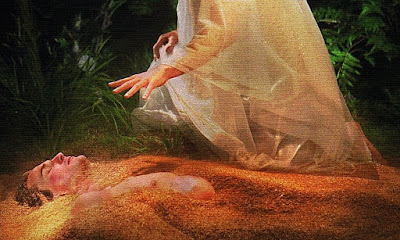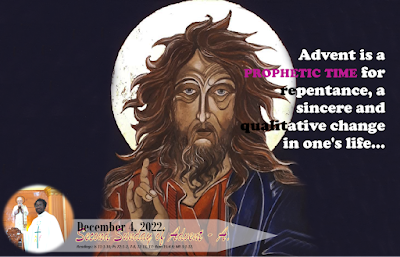ALL THINGS BELONG TO GOD.
October 18, 2020
Twenty-ninth Sunday in Ordinary Time - A
A Corsican proverb says, “The soul belongs to God, and possessions to their owners.” And an Ivorian proverb adds, “Though the sky belongs to the bird it can’t fly when it’s raining.”
“… Give to the LORD glory and praise; give to the LORD the
glory due his name!” Glory, honor, and praise belong by right to God. Nothing
of what we rejoice about or of what we do is out of his reach and his
authority. Actually, he alone has power over all things. Therefore, what could
a man boast about that is not from God? What do you have that has not been
given to you by God? Even you yourself belong to him. Here we could nicely
recall the conversation at the creation. It is said that, after he finished
creating all animal and other living creatures, God said to himself in an intimate
communication, a God to God dialogue, “Let us make human beings in our image,
after our likeness” (Gn 1:26). This sentence, not only expresses our belonging
to God because made by him, but most importantly, it shows that we are at the
likeness of God, his photocopies. The copy belongs to the original in terms of
copyrights.
We are therefore created in the image and the likeness of
God. The image speaks of identity. It says everything about us, who we are,
what we are worthy of, and where we belong. Because we are God's image, we
belong to him, with all that we are and all that we do.
Today’s liturgy, we could say in a certain way, puts an
accent on our belongingness to God. Though we live on this earth with our
capabilities, possessions, positions, and all that we know, we are God’s
property. It sets a very special emphasis as well on the relationship we should
entertain with the society, and the earth where we live. One can conclude that
the point of the word of God today is, the relationship, Christian, and the
State. Created in the image and likeness of God, we all share the same rights
and obligations as anybody else in the places where we live, claiming no
exemption or special privilege. We belong to God; we also belong to our
societies. We are citizens of heaven and earth, with all its implications.
In the first reading, through the Prophet Isaiah, the Lord
reveals that all authority belongs to him and he is the one who gives power to
him whom he wishes. Thus, he made the choice of a Pagan King, Cyrus, to restore
the glory of his people. Therefore, it comes out very clearly that Cyrus
belongs to God. He was his instrument toward Israel during their Babylonian
exile. And so, the Lord says, “For the sake of Jacob, my servant, of Israel, my
chosen one, I have called you by your name, giving you a title, though you knew
me not.”
All power belongs to God. In the Gospel, through an
allegory, while he was questioned about the taxes to be paid or not be paid to the
Emperor Caesar, the Lord Jesus answers that the king himself, together with all
that he possesses belongs to God. Many people see in this extract of St.
Matthew the declaration of the separation between State and Religion. For,
Jesus says, “repay to Caesar what belongs to Caesar and to God what belongs to
God.”
By definition, it is said that the notion of separation of
church or religion and state is a philosophic and jurisprudential concept for
defining political distance in the relationship between religious organizations
and the state. Conceptually, the term refers to the creation of a secular
state. That speaks of areas of competences between the religion and the state.
That religious matters should not affect or color state affairs. One thing,
however, in this separation is that State and Religion interact and meet on one
point, their subjects. The subject of religion is the human being, created in
the image and likeness of God. The subject of State is the same human being,
image, and likeness of God. This, therefore, points out the limits of this
separatist philosophy that some hold so dearly.
Besides, the emphasis of Jesus was not on the separationism
but rather an inclusionism, that is, all belong to God, even what belongs to
the king, belongs as well to God, knowing that the king himself is the “image
and likeness of God”. The question of Jesus to those who were willing to trap
him and their response is the more evocative: “Whose image is this and whose
inscription? ... They replied, Caesar's.” Caesar’s image and inscription are on
the coin. Therefore, the coin belongs to Caesar. But on Caesar himself, whose
image and inscriptions are marked? Are they not those of God? Therefore, Caesar
belongs to God. He and his possession and power belong altogether to God.
This answer of our Lord Jesus Christ can be a beautiful call
on attention to all our today’s leaders and kings who boast of their authority
and power. You have the power because it has been given to you by God. You are
nothing, but mere instruments into his hands to lead, teach, and discipline his
people. You should be humble enough to acknowledge your nothingness without
God. The same who gives you the power that gives you such glory can take it
away from you at any time. And not only your power, even your life can be taken
away from you, as it also belongs to him. God is the one who guides the life
and history of all peoples and nations. If your power and possession cause you
to lose your mind or lack humility, the realities of life and truth will have
the heavy task of opening your eyes.





Comments
Post a Comment